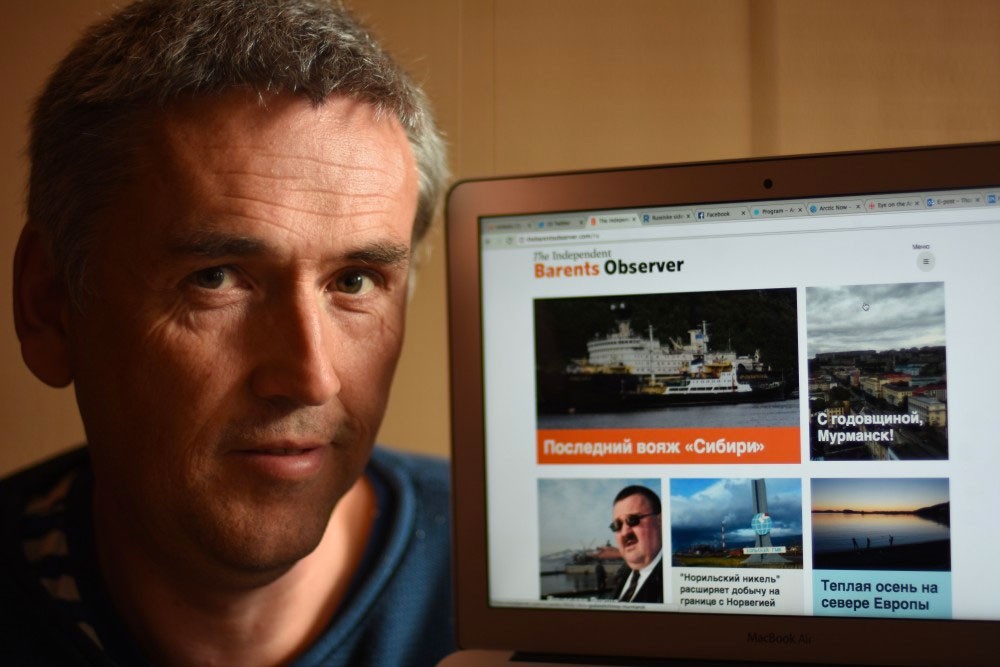
The system built to manage Russia’s nuclear legacy is crumbling, our new report shows
Our op-ed originally appeared in The Moscow Times. For more than three decades, Russia has been burdened with the remains of the Soviet ...
News

Publish date: December 5, 2017
News
Moscow’s City Court has refused to say Russia’s Federal Security Service acted illegally when it banned Norwegian newspaper editor Thomas Nilsen from travelling in Russia –a case Nilsen now vows he will take to the country’s Supreme Court.
Nilsen, a past member of Bellona’s Russia group who now edits the bilingual online Independent Barents Observer news portal in Kirkenes, Norway, was told in March at a border crossing he was no longer allowed to enter Russia as he posed a security risk.
Days later, he learned that his name had been added to a stop list of undesirable individuals, and he was told he wouldn’t be allowed into Russia for five years – apparently in retaliation for EU and Norwegian travel blocks on specific Russians. At the time, Nilsen challenged the vague FSB decision in court.
On Monday, the Moscow City Court – a longtime cloak and dagger refuge for the FSB’s veiled cases – turned down his demand that the ban on his travel be declared illegal, apparently siding with the FSB’s desire to keep the nature of the ban a secret.
Nilsen’s lawyer, human rights veteran Ivan Pavlov, said on Monday he wasn’t even allowed to review the reason behind the FSB decision to keep Nilsen out of Russia because it was classified.
“As in many cases in which the FSB is a party, neither the court nor the special services allowed our lawyers to review these documents, which they said are classified,” Pavlov told the Interfax newswire. “This included, for example, the very decision by the FSB not to permit Nilsen into Russia, the reasons for which neither we nor Nilsen have been able to find out.”
Nilsen responded to the Moscow City Court decision by telling Bellona he intends to pursue his case to the Russian Supreme Court.
“It is important for me to smoke out why FSB has named me a threat to national security,” he said via Skype. “Only people that have something to hide will try to push ‘national security’ as an argument not to disclose their real agenda – I have nothing to hide, therefore I think it is important to challenge FSB. Next time it will be in the Supreme Court.”
Nilsen – who has spent the last three decades traveling without incident to and from Russia for civil society and reporting purposes – has not been allowed into Russia to speak on his own behalf.
His news portal covers issues of cross border cooperation between Norway and Russia, and his reporting has often raised hackles on both sides of the divide.
The portal routinely writes on pollution emanating from Russian industry on the Kola Peninsula, Arctic oil exploration, Moscow’s pursuit of so-called foreign agent civil society groups, as well as the ongoing saga of nuclear waste produced by the Russian Navy’s Northern Fleet.
Nilsen has said numerous times over the 11 months since he was banned from Russia that it’s not the reporting his portal does that puts him afoul of the authorities, but that he makes his reporting available in the Russian language.
“The Barents Observer is a friend to Russia, to the Russian people and to cross-border relationship building in the high north,” he said on Monday. “Journalism is a tool for building trust and understanding between neighboring countries.”
Still, officialdom on both sides of the border has attempted to squelch the portal, at one point making it the focus of a backstairs flap between Norwegian government and the FSB.
At the time, Norwegian officials overseeing the paper had pressured Nilsen and his staff to dull their editorial edge.
But Nilsen refused. He and his staff left the paper, later reopening it and placing its ownership in the hands of its journalists.
Soon thereafter, state broadcaster NRK carried a report citing an anonymous official who said the FSB had pressured the Norwegian officials responsible for the portal to gag it.
As surprising as the travel ban was to Nilsen, his acquaintance with FSB hostilities is a long one. During his tenure with Bellona, he was deeply involved in the defense of Alexander Nikitin, the Bellona expert from Russia who in 1995 was charged with treason for his contributions to the organization’s report on radioactive waste handling in the Russian Navy.
Russia’s Supreme Court acquitted Nikitin in 2000, but Nilsen and other Bellona staff who co-authored the report were targeted with visa rejections while they worked on Nikitin’s defense in 1996.

Our op-ed originally appeared in The Moscow Times. For more than three decades, Russia has been burdened with the remains of the Soviet ...

The United Nation’s COP30 global climate negotiations in Belém, Brazil ended this weekend with a watered-down resolution that failed to halt deforest...

For more than a week now — beginning September 23 — the Zaporizhzhia Nuclear Power Plant (ZNPP) has remained disconnected from Ukraine’s national pow...

Bellona has taken part in preparing the The World Nuclear Industry Status Report 2025 and will participate in the report’s global launch in Rome on September 22nd.